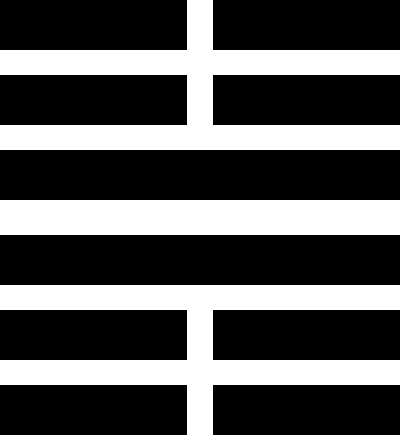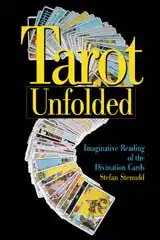
Upper trigram: Chên The Arousing, Thunder
Lower trigram: Kên Keeping Still, Mountain
The Judgement
Preponderance of the Small. Success.
Perseverance furthers.
Small things may be done; great things should not be done.
The flying bird brings the message:
It is not well to strive upward,
It is well to remain below.
Great good fortune.
The Image
Thunder on the mountain:
The image of Preponderance of the Small.
Thus in his conduct the superior man gives preponderance to reverence.
In bereavement he gives preponderance to grief.
In his expenditures he gives preponderance to thrift.
The Lines
These texts apply only for the lines that were marked, when the hexagram was cast. Note that the lines are counted from the bottom up.
The bottom line marked means:
The bird meets with misfortune through flying.
The 2nd line marked means:
She passes by her ancestor
And meets her ancestress.
He does not reach his prince
And meets the official.
No blame.
The 3rd line marked means:
If one is not extremely careful,
Somebody may come up from behind and strike him.
Misfortune.
The 4th line marked means:
No blame. He meets him without passing by.
Going brings danger. One must be on guard.
Do not act. Be constantly persevering.
The 5th line marked means:
Dense clouds,
No rain from our western territory.
The prince shoots and hits him who is in the cave.
The top line marked means:
He passes him by, not meeting him.
The flying bird leaves him.
Misfortune.
This means bad luck and injury.
The interpretations above and comments below are from Richard Wilhelm's version of the I CHING.
Comments on the Hexagram
While in the hexagram Ta Kuo, PREPONDERANCE OF THE GREAT (28), the
strong lines preponderate and are within, inclosed between weak lines at the
top and bottom, the present hexagram has weak lines preponderating, though
here again they are on the outside, the strong lines being within. This indeed
is the basis of the exceptional situation indicated by the hexagram. When
strong lines are outside, we have the hexagram I, PROVIDING
NOURISHMENT (27), or Chung Fu, INNER TRUTH, (61); neither represents
and exceptional state. When strong elements within preponderate, they
necessarily enforce their will. This creates struggle and exceptional conditions
in general. But in the present hexagram it is the weak element that perforce
must mediate with the outside world. If a man occupies a position of
authority for which he is by nature really inadequate, extraordinary prudence
is necessary.
The Judgement
Exceptional modesty and conscientiousness are sure to be rewarded with
success; however, if a man is not to throw himself away, it is important that
they should not become empty form and subservience but be combined
always with a correct dignity in personal behavior. We must understand the
demands of the time in order to find the necessary offset for its deficiencies
and damages. In any event we must not count on great success, since the
requisite strength is lacking. In this lies the importance of the message that
one should not strive after lofty things but hold to lowly things.
The structure of the hexagram gives rise to the idea that this message is
brought by a bird. In Ta Kuo, PREPONDERANCE OF THE GREAT (28), the
four strong, heavy lines within, supported only by two weak lines without,
give the image of a sagging ridgepole. Here the supporting weak lines are
both outside and preponderant; this gives the image of a soaring bird. But a
bird should not try to surpass itself and fly into the sun; it should descend to
the earth, where its nest is. In this way it gives the message conveyed by the
hexagram.
The Image
Thunder on the mountain is different from thunder on the plain. In the
mountains, thunder seems much nearer; outside the mountains, it is less
audible than the thunder of an ordinary storm. Thus the superior man
derives an imperative from this image: he must always fix his eyes more
closely and more directly on duty than does the ordinary man, even though
this might make his behavior seem petty to the outside world. He is
exceptionally conscientious in his actions. In bereavement emotion means
more to him than ceremoniousness. In all his personal expenditures he is
extremely simple and unpretentious. In comparison with the man of the
masses, all this makes him stand out as exceptional. But the essential
significance of his attitude lies in the fact that in external matters he is on the
side of the lowly.
The Lines
The bottom line marked
A bird ought to remain in the nest until it is fledged. If it tries to fly before
this, it invites misfortune. Extraordinary measures should be resorted to only
when all else fails. At first we ought to put up with traditional ways as long
as possible; otherwise we exhaust ourselves and our energy and still achieve
nothing.
The 2nd line from the bottom marked
Two exceptional situations are instanced here. In the temple of ancestors,
where alternation of generations prevails, the grandson stands on the same
side as the grandfather. Hence his closest relations are with the grandfather.
The present line designates the grandson's wife, who during the sacrifice
passes by the ancestor and goes toward the ancestress. This unusual behavior
is, however, an expression of her modesty. She ventures rather to approach
the ancestress, for she feels related to her by their common sex. Hence here
deviation from the rule is not a mistake.
Another image is that of the official who, in compliance with regulation,
first seeks an audience with his prince. If he is not successful in this, he does
not try to force anything but goes about conscientious fulfillment of his duty,
taking his place among the other officials. This extraordinary restraint is
likewise not a mistake in exceptional times. (The rule is that every official
should first have an audience with the prince by whom he is appointed. Here
the appointment is made by the minister.)
The 3rd line from the bottom marked
At certain times extraordinary caution is absolutely necessary. But it is just in
such life situations that we find upright and strong personalities who,
conscious of being in the right, disdain to hold themselves on guard, because
they consider it petty. Instead, they go their way proud and unconcerned. But
this self-confidence deludes them. There are dangers lurking for which they
are unprepared. Yet such danger is not unavoidable; one can escape it if he
understands that the time demands that he pay especial attention to small
and insignificant thing.
The 4th line from the bottom marked
Hardness of character is tempered by yielding position so that no mistakes are
made. The situation here calls for extreme caution; one must make no
attempt of one's own initiative to reach the desired end. And if one were to
go on, endeavoring one must be on guard and not act but continue inwardly
to persevere.
The 5th line from the bottom marked
As a high place is pictured here, the image of a flying bird has become that of
flying clouds. But dense as the clouds are, they race across the sky and give
no rain. Similarly, in exceptional times there may be a born ruler who is
qualified to set the world in order, but who cannot achieve anything or confer
blessing on the people because he stands alone and has no helpers. Is such
times a man must seek out helpers with whose aid he can carry out the task.
But these helpers must be modestly sought out in the retirement to which
they have withdrawn. It is not in the fame nor their great names but their
genuine achievements that are important. Through such modesty the right
man is found, and the exceptional task is carried out in spite of all difficulties.
The top line marked
If one overshoots the goal, one cannot hit it. If a bird will not come to its nest
but flies higher and higher, it eventually falls into the hunter's net. He who
in times of extraordinary salience of small things does not know how to call a
halt, but restlessly seeks to press on and on, draws upon himself misfortune
at the hands of gods and men, because he deviates from the order of nature.
Further Reading
Here I add some perspectives on this hexagram, as well as other methods to read its meaning, in additon to what Richard Wilhelm derives from it above.
Meaning of the Trigrams Combined
Each hexagram combines two trigrams, making one the upper and the other the lower. The meaning of the hexagram is mainly derived from that combination. Here's what it means for this hexagram:
Thunder upon Mountain
This part of the text is being edited. It will be added shortly.
Compare to the Reversed Trigrams
It's common to compare a hexagram to the one where the lines are the opposite: a full line is broken and a broken line full. But I find it much more interesting to compare hexagrams with the trigrams reversed: the upper trigram becomes the lower, and the lower trigram becomes the upper. That deepens the understanding of the trigrams at work — when they're not identical. Click the image to see what it means for the two trigrams of this hexagram:

The hexagram with the trigrams reversed
Compare to the Reversed Lines
You can also compare this hexagram to its opposite according to the six lines, where each broken line is full, and vice versa. In some cases it leads to the same hexagram as the one where the trigrams are switched. Here is the hexagram with reversed lines (click it to get to its webpage):

Hexagram with opposite lines
Click the header to read more about the eight trigrams that are combined into the 64 hexagrams.
The 64 I Ching Hexagrams
An I Ching hexagram is composed of two trigrams. Each of the 64 hexagrams has its own name, meaning, and divinatory text. Here they all are, in the traditional order. Click on the image of an I Ching hexagram to get to its webpage.
Use the Facebook field on some of these web pages to comment the I Ching or this website.




































































